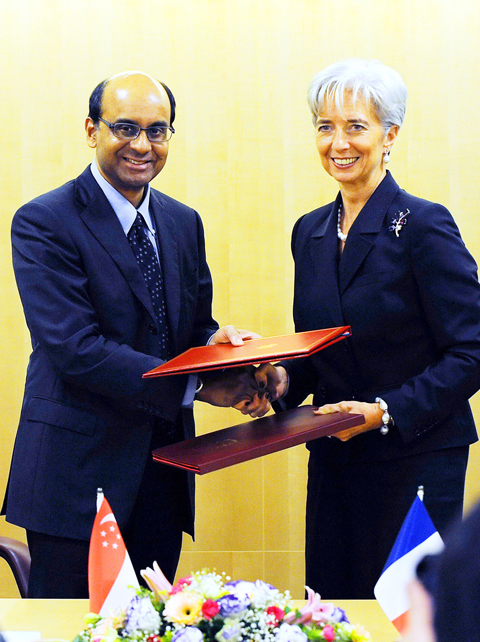Singapore yesterday cleared the final hurdle for complying with stricter standards for global banking centers after signing an agreement with France on the sharing of tax information.
The signing enabled the city-state to get off a “gray list” of countries that have not yet fully implemented standards set by the OECD, the industrialized nations’ club.
The Avoidance of Double Taxation Agreement (DTA) was signed by Singapore’s Finance Minister Tharman Shanmugaratnam and his French counterpart Christine Lagarde.

PHOTO: AFP
It was the 12th such agreement signed by Singapore — the minimum required by the OECD for a country to enter the elite “white list” of financial centers — and will come into force after formal passage by both parliaments.
“I am particularly pleased to sign today the 12th protocol which allows the withdrawing of Singapore from the OECD gray list,” Lagarde said.
The French minister said it was a “significant breakthrough” to see “such an important financial place” like Singapore reaching the OECD white list.
Shanmugaratnam said Singapore “will not stop at 12 agreements.”
“We expect to sign several more by the end of the year and will continue to negotiate such DTAs,” he said.
Singapore last month passed a law aimed at tightening the screws on cross-border tax cheats to comply with the OECD standards.
The island, a top Asian regional banking and corporate center and a favorite for the world’s millionaires to safely park their money, has denied being a haven for tax evaders.

Authorities have detained three former Taiwan Semiconductor Manufacturing Co (TMSC, 台積電) employees on suspicion of compromising classified technology used in making 2-nanometer chips, the Taiwan High Prosecutors’ Office said yesterday. Prosecutors are holding a former TSMC engineer surnamed Chen (陳) and two recently sacked TSMC engineers, including one person surnamed Wu (吳) in detention with restricted communication, following an investigation launched on July 25, a statement said. The announcement came a day after Nikkei Asia reported on the technology theft in an exclusive story, saying TSMC had fired two workers for contravening data rules on advanced chipmaking technology. Two-nanometer wafers are the most

Tsunami waves were possible in three areas of Kamchatka in Russia’s Far East, the Russian Ministry for Emergency Services said yesterday after a magnitude 7.0 earthquake hit the nearby Kuril Islands. “The expected wave heights are low, but you must still move away from the shore,” the ministry said on the Telegram messaging app, after the latest seismic activity in the area. However, the Pacific Tsunami Warning System in Hawaii said there was no tsunami warning after the quake. The Russian tsunami alert was later canceled. Overnight, the Krasheninnikov volcano in Kamchatka erupted for the first time in 600 years, Russia’s RIA

South Korea yesterday said that it was removing loudspeakers used to blare K-pop and news reports to North Korea, as the new administration in Seoul tries to ease tensions with its bellicose neighbor. The nations, still technically at war, had already halted propaganda broadcasts along the demilitarized zone, Seoul’s military said in June after the election of South Korean President Lee Jae-myung. It said in June that Pyongyang stopped transmitting bizarre, unsettling noises along the border that had become a major nuisance for South Korean residents, a day after South Korea’s loudspeakers fell silent. “Starting today, the military has begun removing the loudspeakers,”

CHINA’s BULLYING: The former British prime minister said that he believes ‘Taiwan can and will’ protect its freedom and democracy, as its people are lovers of liberty Former British prime minister Boris Johnson yesterday said Western nations should have the courage to stand with and deepen their economic partnerships with Taiwan in the face of China’s intensified pressure. He made the remarks at the ninth Ketagalan Forum: 2025 Indo-Pacific Security Dialogue hosted by the Ministry of Foreign Affairs and the Prospect Foundation in Taipei. Johnson, who is visiting Taiwan for the first time, said he had seen Taiwan’s coastline on a screen on his indoor bicycle, but wanted to learn more about the nation, including its artificial intelligence (AI) development, the key technology of the 21st century. Calling himself an